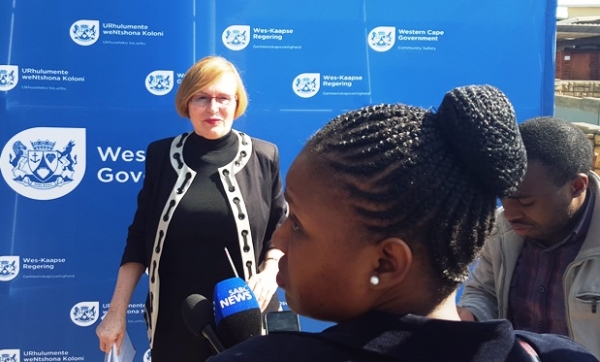Khayelitsha Commission: it’s up to the Minister now, says Zille

Until national police minister Nathi Nhleko signs the Khayelitsha Commission of Inquiry recommendations, 90 percent of them cannot be implemented, according to Western Cape Premier Helen Zille.
Accompanied by Provincial Minister for Community Safety, Dan Plato, Zille reported back at Lookout Hill in Khayelitsha on 26 August on the outcome of her meeting with the office of the National Police Commissioner, Riah Phiyega. She also outlined steps taken by the Western Cape government, to implement the Commission’s recommendations.
Zille said the Commission had found a breakdown in the relationship between the Khayelitsha community and the South African Police Service (SAPS) and had made 20 recommendations, most of which fell within the jurisdiction of the SAPS.
She said the province had tried to implement those recommendations which fell within its jurisdiction, including
•successful community policing forum (CPF) elections at all three stations in Khayelitsha, facilitated together with local SAPS;
•training of CPF members
•convening of a forum of civil society groups focused on preventing vengeance attacks and killings
•development of a strategy with SAPS to create awareness of crimes against women and children, and to strengthen support to victims, coordinated by a sub-forum.
“By far the majority of recommendations, however, rely on the signing of a draft Memorandum of Agreement between the Community Safety Department and SAPS,” said Zille in her speech.
To nods and mumbles from the crowd, Ndithini Tyhido, Khayelitsha Development Forum chairperson, said Zille was “recklessly insinuating that the police were the enemy”.
He said illegal shebeens in the township were big contributors to crime, claiming there were 34 licensed shebeens in Khayelitsha and 1,400 unlicensed. “There are no public meetings about these things. We need to know what we can do as the community to protect our police from being attacked”.
A member of the South African National Civic Organisation, Qhama Bongikhaya, asked why Khayelitsha residents were not invited to the meetings Zille referred to and accused her of using the meetings as a political platform.
“Don’t use crime to garner support for the 2016 elections,” he said.
In response to both, Zille said there was no indication in anything that she said that police were the enemy nor did what she say have anything to do with politics. “We are doing what the law and the constitution says we can do. I am here to report back to the people about what has been done. You cannot expect us to send out invitations to every single person. The people who complained to us directly were told about this meeting and they told the relevant people, which means you were told too, which is why you are here.”
“SAPS is the only force which can close or raid unlicensed shebeens, I have no power in the law and constitution to give the police an instruction,” she said.
Speaking to journalists after the briefing, about the establishment of a joint task team which would work through the Commission’s report and recommendations, Zille said: “We’ve set up the task team between the police and the province in order to listen to the concerns that the national police commissioners have about the proposals in the Khayelitsha commission, to get those concerns out of the way so we can implement the work on the recommendations. We need to get a signature from the national police minister, otherwise we cannot implement 90 percent of those recommendations.”
She said the task team would set out its own terms of reference. “At least we are making some progress now, it’s been a year on and we haven’t had that memorandum of understanding signed yet. I’m hopeful now that we can make some progress.”
Zille said she was determined not to let the Khayelitsha Commission’s recommendations “go to waste”.
“They are excellent, the police in this province like them, the community wants them, everybody believes they will really improve policing, we just need one signature and we plan to get that signature. We have done everything that we can without the police, we cannot implement recommendations which affect the South African Police Service unless they get an instruction from the national level, because policing is a national competence. The constitution says the commission of inquiry recommendations need to be signed to be signed off by the minister.”
“What we have been doing is training community police forums, getting all the recommendations of the Khayelitsha Commission into the police plans for the Western Cape. But we need that signature to implement the recommendations,” said Zille.

This article is licensed under a Creative Commons Attribution-NoDerivatives 4.0 International License.


